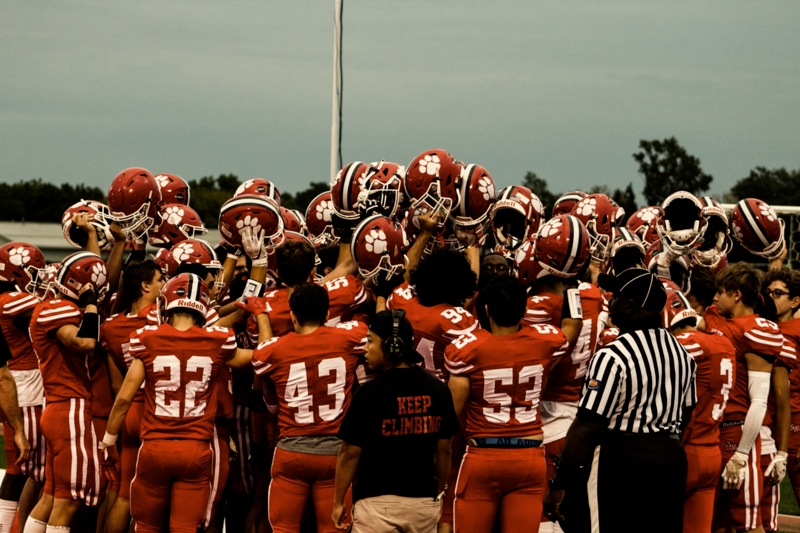How to Develop a Team Mentality

In the broadest sense, a team is a group of people united in an effort to achieve a common goal or complete a task together. Teams can beautify a town together, win the frisbee competition, or kick a ball into a net the most times. A great team can be defined as one that works together well, keeps a strong team mentality, unites to become as effective and as efficient as possible, and reaches goals together.
Students can learn much from being on a well-coached team. Especially those hoping to play college sports. Below, discover 4 key benefits of being on a team and how you can develop a team mentality to build a strong team.
4 Benefits of Being on a Team
1. Understanding your own value
Because you’re wired with unique life experiences, you have a different perspective than anyone else. You’ve learned where you excel and where you just muddle through, but because they’re “normal life” to you, you might struggle to see the value of these innate and learned behaviors.
Playing or working on a team allows you to see how your strengths differ from others and helps you understand how to use your strengths to better the group.
2. Improved morale
Anyone can go through life alone. But when things get tough, you may get discouraged. When you’re on a team, you learn how you can get through almost anything! You build a bond with another, and because you’re all chasing the same goal, everyone takes turns encouraging one another.
Being on a team also gives you a place to thrive. You see how you’re needed and how you contribute to the betterment of everyone. Feeling valued and appreciated is one of the biggest morale boosters ever! Attitude matters, especially when you’re on a team!
3. Discovering the importance of a good work ethic
It’s one thing to expect great things from yourself. You can always pause on your goal whenever you’d like, or push things off to another day pretty easily. But when you’re part of a team and have goals to accomplish, you quickly realize that if you procrastinate, the entire team suffers.
Each team member acts as an accountability partner. And there’s no greater sense of accomplishment than when you, as a team, accomplish something far greater than any of you could do on your own.
4. Learning conflict resolution skills
When you’re working as a group, you can expect there to be some bumps in the road. If someone has an off day, it affects the team. If someone misses his mark, they may force the entire team to deal with a loss. And if someone isn’t giving it their all, the rest of the team may get frustrated with her.
In order for a team to remain strong and unified, each team member must learn how to address problems as they arise. Instead of attacking a team member, you learn how to come alongside, encourage, and motivate each other.
5 Tips to Strengthen Your Team Mentality

1. Determine your goals for the season
At the very beginning of the season, sit down together and determine your team goals. These will shape your purpose for the season and determine how you approach each practice session, as well as your opponents.
Maybe you have a specific rival to beat, or you want more wins than losses. Maybe you simply want to have fun. Whatever the goal, make sure it’s realistic and attainable.
After you set a few team goals, challenge each individual team member to come up with a few personal goals to share with the team.
2. Set clear expectations
Make your expectations for behavior clear from the beginning and be consistent in enforcing them. These may be anywhere from showing up on time to practice, being active in a team chat, or keeping the lockers cleaned up to keeping tempers in check, being friendly, or always playing fair.
3. Practice empathy
Each team member’s performance is based on physical and emotional factors. You can build a team’s physical strength every single day yet still lose games to weaker teams.
Emotions like fear and anger can also play a role in physical performance. A successful coach understands the emotions of the team and walks with them through the highs and lows. Loss is real, as is failure and disappointment. Empathy allows you, as a team, to acknowledge it, get to the other side of it, and become stronger. Empathy lets you know when to push your team and when to encourage them.
When you model empathy, the team can practice it with each other as well. A healthy dose of empathy builds trust and camaraderie and allows everyone to work better together.
4. Assign team leaders
Give team members the ability to lead their peers. Look for natural leaders and those with leadership potential. Talk to them about the ways leadership can be defined and your expectations for them as they help lead the team.
Acknowledge the risks and benefits of leadership. Get their input on decisions, and encourage your leaders to build relationships with all team members, not just the ones they relate to the most.
5. Look for teaching opportunities
A team mentality provides endless opportunities for teaching. Whether a win, a loss, a miscommunication, or an accident, these all provide ample opportunity to learn, grow, and become better as a team. Don’t forget to help them learn how to celebrate their wins, whether it’s achieving a personal goal, team goal or a win out on the field.
